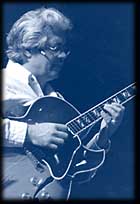
|
|
|
|
|
|
Photo Credit: Tim Owens |
Larry Coryell
On this edition of Billy Taylor's Jazz at the Kennedy Center, versatile virtuoso guitarist Larry Coryell proves to be more than an outstanding musician; he’s also a particularly enlightening and affable conversationalist. Dr. Taylor introduces Coryell with this resounding endorsement: "[Larry] plays all the styles, Latin, jazz-rock, straight ahead jazz, European classical music, you name it, he's a master of it." Billy further emphasizes that Coryell "takes all of the elements that are a part of the great guitar literature and kind of puts them into a special style." Coryell lives up to these high praises from the start, as he opens with a sparkling rendition of the standard "On Green Dolphin Street." A native of Galveston, TX, Coryell elaborates on this regional influence as he quips "you can take the boy out of Texas, but you can't take the Texas out of the boy." He notes than an early influence was the country-western guitarist Chet Atkins. Larry later moved to Richland, WA, where his guitar teacher turned him on to jazz chords and voicings. He explains, "then I discovered Wes [Montgomery] and the rest is history." Such glowing praise of Montgomery is not uncommon, given his enormous influence on jazz guitarists. Coryell comments on Montgomery's pioneering sound. Young Larry discovered that the guitar was truly his instrument at age 15. His first major jazz job came with drummer Chico Hamilton's band in 1965. Coryell was an early participant in the then burgeoning jazz-rock scene. He joined the Free Spirits band, which blended jazz improvisation with the immediacy and energy of rock music. In 1967 and ’68, news of Coryell's guitar prowess traveled quickly on the heels of a stint in vibraphonist Gary Burton's band. With such a wide array of experiences, including both electric and acoustic guitar work, Coryell became highly sought after in a period when guitar was king. Billy describes Coryell as a "renaissance man," and asks him how he absorbed so many guitar styles. Coryell sums it up simply, "There's so many beautiful ways of playing the instrument." Larry then performs the classic "Manha de Carnival" with Billy's trio, illustrating his considerable investment in Brazilian sounds. Other selections on the show include a trio version of Thelonious Monk's "Trinkle Tinkle." Coryell happily gets to work with his frequent playing mates, drummer Steve Johns and bassist Chip Jackson, whom he admits to "borrowing" from Billy on occasion. He also plays Monk's lovely ballad "Ruby My Dear" with just Dr. Taylor accompanying. This enthusiastic audience displays a great affinity for guitar and is apparently thick with guitarists. One member asks Coryell about his practice regimen. Larry reveals that he has been inspired to practice increasingly in recent years, largely on an acoustic nylon stringed guitar with no enhancements. Then when he plugs in an electric, he finds its sound even more refreshing. Another audience member pipes up with a question about the characteristically intricate compositions Coryell performed when he worked in fusion bands, like Chick Corea's Return To Forever. Coryell suggests that composition was "...the single most redeeming factor of that [70s] fusion era." Larry then demonstrates his facility with highly original voicings in a spirited version of Miles Davis' classic "All Blues."
Don't miss Larry Coryell in our Photo Gallery!
|
|
| |
This page and its contents Copyright© 1999 National Public Radio

